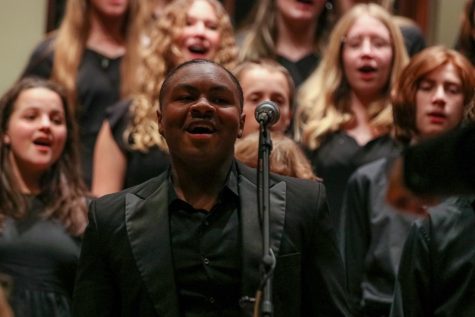Good game, well played
Esports become more mainstream
Photo: Grant Webb
A collection of Grant Webb’s controllers for various gaming systems are photographed together. He purchased specific controllers, as they suit some games better than the others.
Gamers are frequently told that what they do is a waste of time. However, the past few years have seen a large growth in esports, legitimizing it as a feasible path to college and career.
Eric “ESAM” Lew, like many adolescent boys, has enjoyed video games since his youth. Unlike many, he had a natural gift for playing “Super Smash Bros.” At the age of 10, he was convinced by his older brother to compete in a tournament with a strict ruleset. After finishing in the top eight, he went on to become one of the best “Smash Bros” players in the world.
Typically, a gamer’s source of income comes from either tournament winnings, sponsorships or subscriptions to their livestream. There are organizations dedicated to providing for professional gamers, including Cloud 9, Team SoloMid and [A]lliance. Each organization is dedicated to growing electronic sports, or esports, by supporting the players. To do this, each team picks top players to sponsor and then supplies them with any gear they need to perform, as well as travel fare and hotel rooms for tournaments. “Sponsors will pay players a salary relative to how much they feel the player is worth,” ESAM said. “[However], many of the players are very young, so they are unfamiliar with the fact that they can negotiate for a higher salary.”
Esports are not limited to a single game, such as how sports are not limited to football or basketball. Often, individual games begin with a grassroot community of players who actively support the growth of a game so it can become a major esport. “Call of Duty,” “Counter-Strike” and many other fighting games began as grassroots communities, where as slower-paced strategy games, such as “League of Legends” and “Starcraft,” are actively supported and balanced for competitive play by the developer.
For grassroots communities to work, there needs to be active individuals dedicated to supporting the game as an esport. For example, “Super Smash Bros” has tournament organizers, broadcasters and, of course, the players.
The role of a tournament organizer is rather self-explanatory. At the most basic level, they advertise the tournament and make sure it runs smoothly. For major events, they will invite top players and reach out to broadcasting studios to cover their event and accumulate viewers.
Broadcasters are typically organized into studios such as VGBootCamp, Beyond the Summit, Tourney Locator, JoinDota and The GD Studio. Each studio is dedicated to broadcasting and spreading word of events. Major and some minor events will request a studio to cover their event with a live broadcast of games alongside pre- and post-game interviews. The number of competing studios inspires competitors to strive for higher production quality.
To make a living off of gaming, one does not have to be a top-level player. There are many personalities in gaming who make a living as an entertainer. “Streamers” will spend between three and 24 livestreaming gameplay to their fans.
“I have a lot of free time right now, and I don’t want a normal job because video games are more fun for now,” ESAM said about livestreaming his gameplay. “I figured I’m pretty entertaining, and my personality is lively, so I decided to just go for it.”
A popular platform for this is Twitch.tv. Twitch.tv is a website that allows each user to create and customize a page where they can broadcast gameplay and interact with viewers through a live chat room. Streamers thrive off of interactions with their fans, and given such an interactive platform, they are able to engage with their audience in real time.
Esport scholarships have been recently offered from multiple universities including Columbia College, Robert Morris University, University of Pikeville, Maryville University and Southwestern University.
“If there is an opportunity that will lead a student to a career path or business opportunities, I am all for it,” Director of College Guidance Mr. Timothy Gibson said when asked about the legitimacy of esport scholarships. “Clearly video games resonate with millions of people, and I believe it could become a mainstream sport in the future.”
Some gamers earn revenue through content creation, whether this is physical merchandise that appeals to the community they are a part of or media intended for their community to enjoy. Merchandise is often comprised of art which will be printed for posters or apparel. But media can be anywhere, from articles to tutorials.
When asked why he creates informative videos about “Super Smash Bros” ESAM said, “I’m one of the top players, and I don’t enjoy when only one or two people give their opinion. It is not actually the popular opinion, and everyone bandwagons on them.”
As the community support for esports remains consistent, there will be a competitive environment. Players are the core of esports, and without them, there will be no way for the community to grow.
For now esports are in their infancy, but in the future they are coming close to a legitimate sport in the athletic world.
“I feel that esports are way more exciting than physical sports for me,” senior Connor Funck said. “It is something you can always do. You can’t always go out and play football, but you can play these games whenever you want.”









